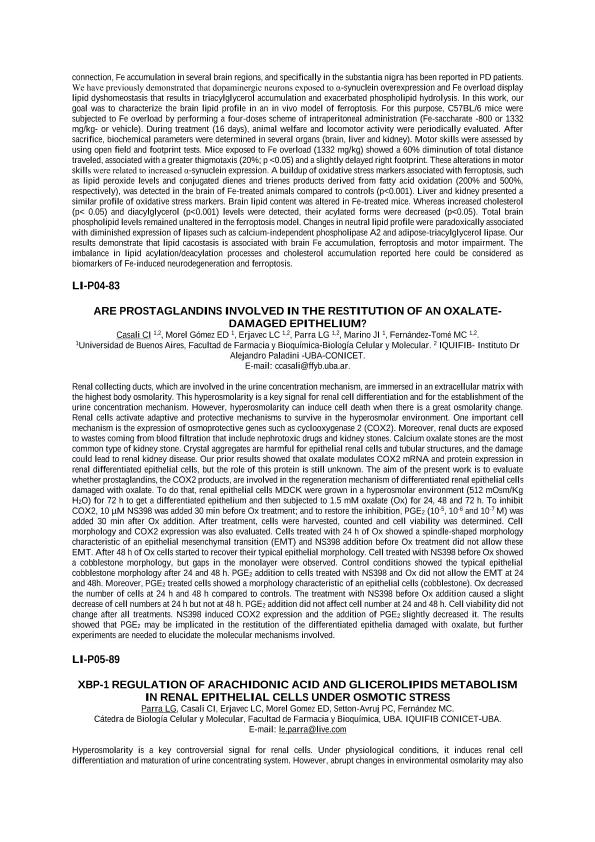Evento
XBP-1 regulation of arachidonic acid and glicerolipids metabolism in renal epithelial cells under osmotic stress
Parra, Leandro Gastón ; Casali, Cecilia Irene
; Casali, Cecilia Irene ; Erjavec, Luciana Cecilia
; Erjavec, Luciana Cecilia ; Morel Gómez, Emanuel Dario
; Morel Gómez, Emanuel Dario ; Setton, Clara Patricia
; Setton, Clara Patricia ; Fernandez, Maria del Carmen
; Fernandez, Maria del Carmen
 ; Casali, Cecilia Irene
; Casali, Cecilia Irene ; Erjavec, Luciana Cecilia
; Erjavec, Luciana Cecilia ; Morel Gómez, Emanuel Dario
; Morel Gómez, Emanuel Dario ; Setton, Clara Patricia
; Setton, Clara Patricia ; Fernandez, Maria del Carmen
; Fernandez, Maria del Carmen
Tipo del evento:
Reunión
Nombre del evento:
LVII Annual Meeting of the Argentine Society for Biochemistry and Molecular Biology Research and XVI Annual Meeting of the Argentinean Society for General Microbiology
Fecha del evento:
11/2021
Institución Organizadora:
Sociedad Argentina de Investigación Bioquímica y Biología Molecular;
Asociación Civil de Microbiología General;
Título de la revista:
Biocell
Editorial:
Tech Science Press
ISSN:
1667-5746
Idioma:
Inglés
Clasificación temática:
Resumen
Hyperosmolarity is a key controversial signal for renal cells. Under physiological conditions, it induces renal celldifferentiation and maturation of urine concentrating system. However, abrupt changes in environmental osmolarity may also induce cell stress that can lead to death. To adapt and survive in such adverse conditions, renal cells implement differentosmoprotective mechanisms that includes both the upregulation of cyclooxygenase-2 (COX-2) expression and prostaglandins(PGs) synthesis from arachidonic acid (AA), and a coordinated increase in phospholipids (PL) and triacylglycerides (TAG)biosynthesis. We previously shown that hyperosmolarity induces ER stress and activates the unfolded protein response (UPR)in Madyn Darby Canine Kidney Cells (MDCK) through IRE1α-XBP1s pathway, and that XBP1s modulates lipid synthesisregulating lipogenic enzymes expression. In the present work we evaluated how XBP1s modulates phospholipase A2(PLA2)/COX-2/PGs pathway and its relationship with lipid synthesis induction under osmotic stress. MDCK cells weresubjected to hyperosmolarity (298-512 mOsm/kg H2O) for different periods of time (0, 12, 24 and 48 h) and treated withdifferent PLA2 (cPLA2, iPLA2 and sPLA2) and IRE1α inhibitors. RT-PCR studies showed that hyperosmolarity increasedcPLA2 expression at 24 and 48 h but did not upregulate iPLA2 expression. Inhibition of cPLA2 but not iPLA2 nor sPLA2prevented hyperosmolarity-induced lipid synthesis and lipid droplets accumulation. Furthermore, IRE1α RNase activityinhibition was accompanied by a decrease in cPLA2 and COX-2 but not in iPLA2 expression evaluated by RT-PCR. Instead,western blot analysis showed a significant increase in COX-2 protein levels when xbp1 (u) splicing was blocked by IRE1αinhibitor. Our findings suggest that the UPR modulates glycerolipids metabolism under osmotic stress by regulatingcPLA2/COX-2/PGs axis.
Palabras clave:
UPR
,
LIPID SINTHESIS
,
COX2
,
PLA2
Archivos asociados
Licencia
Identificadores
Colecciones
Eventos(IQUIFIB)
Eventos de INST.DE QUIMICA Y FISICO-QUIMICA BIOLOGICAS "PROF. ALEJANDRO C. PALADINI"
Eventos de INST.DE QUIMICA Y FISICO-QUIMICA BIOLOGICAS "PROF. ALEJANDRO C. PALADINI"
Citación
XBP-1 regulation of arachidonic acid and glicerolipids metabolism in renal epithelial cells under osmotic stress; LVII Annual Meeting of the Argentine Society for Biochemistry and Molecular Biology Research and XVI Annual Meeting of the Argentinean Society for General Microbiology; Virtual; Argentina; 2021; 1-2
Compartir



